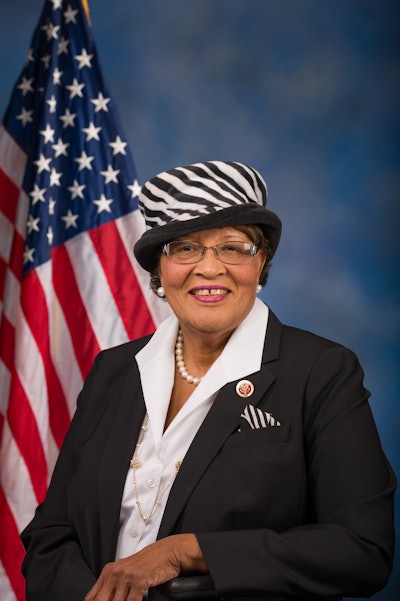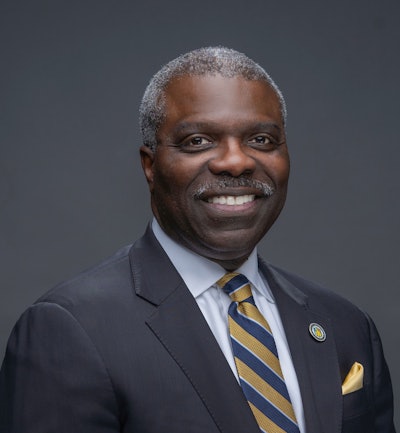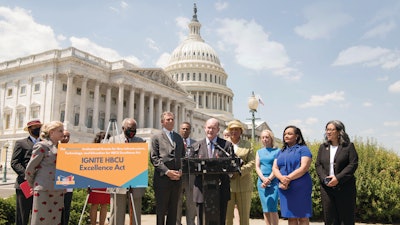The Institutional Grants for New Infrastructure, Technology and Education (IGNITE) for HBCU Excellence Act aims to address long-standing infrastructure issues at the nation’s historically Black colleges and universities.
 Rep. Alma S. Adams
Rep. Alma S. Adams
Rep. Alma S. Adams, D-NC, has been the driving force behind the act. Having earned her bachelor’s and master’s degrees at an HBCU, North Carolina A&T State University, before going on to earn a doctorate at Ohio State University, Adams understands the power and purpose of historically Black institutions. After being elected to Congress in 2014, she established the HBCU Caucus, which is bipartisan and now has 108 members from the House of Representatives and Senate.
John Christie, Adams’ chief of staff, says his boss wanted to “start a national dialogue” around HBCUs that would help “pass meaningful bipartisan legislation” to address issues that plague them.
“She understands that a lot of the things we want our HBCUs to be able to do — whether it be in research and development or the simple task of preparing students for the 21st century workforce — can’t be done if you have dilapidated infrastructure that’s not modernized,” says Christie.
While HBCUs represent only about 3% of all four-year colleges and universities, they produce approximately 17% of all bachelor’s degrees earned by African Americans. First-generation and low-income students comprise almost 60% of the student bodies. Approximately 27% of Black students earning degrees in STEM (science, technology, engineering and mathematics) fields come from HBCUs.
Needs
Christie says Adams supports President Joe Biden’s national infrastructure plan, which will bolster research and development for HBCUs. Based on the conversations Adams has had with leadership at various HBCU institutions, research and development cannot happen unless they have modernized infrastructure.
Adams also founded the HBCU Partnership Challenge, which engages the private sector. IGNITE will use public and private investments that will enable HBCUs to renovate, repair, modernize or construct new campus facilities, including instructional, research and residential spaces. It would provide for reliable, campus-wide, high-speed broadband to support digital learning and long-term technological capacity. Institutions will be able to procure equipment and technology needed to facilitate high quality research and instruction.
Dr. Tony Allen, president of Delaware State University, calls the IGNITE HBCU Excellence Act one of the most important pieces of legislation for HBCUs in the history of Congress.
 Clarence D. Armbrister
Clarence D. Armbrister
Clarence D. Armbrister, president of Johnson C. Smith University (JCSU), which is in Adams’ congressional district, says the IGNITE HBCU Excellence Act is revolutionary and an important tool to finally bring equity to a segment of higher education that has been ignored for too long.
“When you think of current facilities, the deferred maintenance issues [waiting for repair] that we have here on campus are probably in excess of $40 million when you go out over a five- to 10-year period,” says Armbrister. “It has become a challenge.”
There are 48 buildings on the JCSU campus. Only eight buildings are considered in good condition, and 25% of them are considered in poor condition, according to a recent assessment.
After the Charlotte area went through two hurricanes a couple of years ago, JCSU was forced to delay the start of a semester while the buildings were thoroughly cleaned. The damage was due to poor ventilation. The funding proposed by IGNITE would have a direct impact on the ability to address the backlog of deferred maintenance.
The pandemic highlighted the need to upgrade technology and bridge the digital divide, says Armbrister. This remains important, he adds, because post-pandemic JCSU will not return to just the in-person mode of delivery.
Vision
“HBCUs like Delaware State University are graduating our next generation of innovators, educators and community leaders — all of whom contribute greatly to the vitality of our nation and our economy. Yet many of these institutions face underinvestment,” says Sen. Chris Coons, D-DE, who, with Sen. Tim Scott, R-SC, is championing the act in the Senate. “The bipartisan IGNITE HBCU Excellence Act will help modernize campuses at HBCUs across the country, so they have the resources needed to continue their transformational work.”
Delaware State recently acquired Wesley College, a private college that comes with a 50-acre campus in Dover, the state capital. Allen says it gives Delaware State the opportunity to build and add substance to its physical footprint. At present, the university’s deferred maintenance issues are upwards of $80 million, ranging from classrooms to residence facilities.
Allen is aiming to have Delaware State, presently a Research 2 institution, become the first HBCU with Research 1 status.
 Dr. Tony Allen
Dr. Tony Allen
The bill will also provide funds to improve community-based partnerships that provide students and community members with academic, health and social services. These improvements as well as high speed broadband, says Allen, aren’t only important to the HBCUs but also to the communities they serve, which often have large Black and Brown populations.
“We want to make sure they can see us as a significant resource,” he says.
Eye to the Future
Allen, who worked for President Joseph R. Biden when Biden was a U.S. Senator, regularly engages with federal, state and local representatives to provide insight, including testifying before Congress when called upon. Alumni are being engaged in support of the IGNITE HBCU Excellence Act through Delaware State’s digital media strategy.
Additionally, in mid-July, Adams brought U.S. Secretary of Education Dr. Miguel Cardona to the JCSU campus.
 Sen. Chris Coons speaks at the IGNITE announcement in Washington, D.C., with Rep. Alma Adams standing behind him.
Sen. Chris Coons speaks at the IGNITE announcement in Washington, D.C., with Rep. Alma Adams standing behind him.
The fact that Adams has propelled this bill with bi-partisan support, including from Sen. Lindsey Graham, R-SC, is remarkable, says Armbrister. Gordon Holzberg, a legislative assistant for Rep. Adams who helped draft the text for IGNITE, says Adams worked closely with Rep. French Hill, R-AR, Coons and Scott to draft text that would appeal to a broad coalition of members.
“I like the forward-thinking nature of the bill in terms of future development,” says Armbrister. For example, a new light rail line is starting in Charlotte with two stops at the JCSU campus, which Armbrister says presents great opportunity, and the university has a master plan to capitalize on this.
“In order to do the three projects that came out as a priority on our master plan, that’s another $110 million we just don’t have right now,” says Armbrister. He hopes that with the investments resulting from IGNITE, people will see the positive returns for the American economy.
While in North Carolina, Adams and Cardona met with community leaders and convened a roundtable of local and regional leaders who spoke about not only the value of an HBCU education but also the importance of investing in HBCUs at this critical time.
“America is a better place because of those doctors, lawyers and engineers who have gone to HBCUs,” Armbrister says. “I’m hopeful the public will see the significant value of HBCUs as those of us who have benefitted from them already know.”
This article originally appeared in the August 19, 2021 edition of Diverse. Read it here.


















